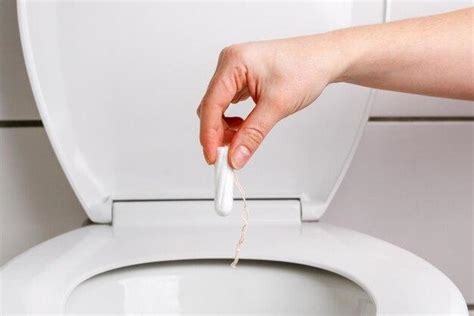The convenience of flushing tampons down the toilet may seem like a quick and easy solution, but it's essential to consider the potential consequences of this action. Tampons are designed to absorb menstrual fluid, and they can expand when exposed to water, causing problems in your plumbing system. In this article, we'll explore the reasons why you should avoid flushing tampons and provide you with some practical alternatives.
The Risks of Flushing Tampons
Flushing tampons can lead to several issues, including:
- Clogged drains: Tampons can get stuck in the pipes, causing blockages and backups. This can result in costly plumbing repairs and even lead to sewage overflowing into your home.
- Damage to septic systems: If you have a septic system, flushing tampons can harm the beneficial bacteria that break down waste. This can lead to system failures and expensive repairs.
- Environmental concerns: Tampons can contribute to the accumulation of non-biodegradable waste in waterways and oceans, harming aquatic life and ecosystems.
Why Tampons Shouldn't Be Flushed
Tampons are not designed to be flushed, and they don't break down in water like toilet paper does. When you flush a tampon, it can:
- Expand and get stuck in the pipes
- Absorb water and become heavier, making it harder to pass through the pipes
- Not break down in the sewage system, causing it to accumulate and contribute to clogs
Alternatives to Flushing Tampons
So, what can you do instead of flushing tampons? Here are some practical alternatives:
- Dispose of tampons in the trash: Wrap the used tampon in toilet paper or a small bag and throw it away in the trash can. This is the most environmentally friendly and safe way to dispose of tampons.
- Use a tampon disposal container: You can purchase or make your own tampon disposal container using a plastic container or a cardboard box. This will keep used tampons separate from other trash and make it easier to dispose of them properly.
- Consider using reusable menstrual products: Reusable menstrual cups, cloth pads, and period panties are becoming increasingly popular. These products can be washed and reused multiple times, reducing the amount of waste generated during your menstrual cycle.

Tips for Proper Tampon Disposal
To ensure proper tampon disposal, follow these tips:
- Always check the packaging: Look for instructions on how to dispose of the tampon. Some brands may have specific guidelines.
- Use a tampon applicator: If you're using a tampon with an applicator, be sure to dispose of the applicator separately from the tampon.
- Don't flush tampon wrappers: The wrappers or packaging of tampons should not be flushed either. Dispose of them in the trash can.
The Benefits of Proper Tampon Disposal
Proper tampon disposal has several benefits, including:
- Reducing waste: By disposing of tampons in the trash can, you're reducing the amount of waste that ends up in landfills and waterways.
- Preventing clogs: Proper disposal of tampons helps prevent clogs in your plumbing system, saving you money on repairs and maintenance.
- Protecting the environment: By keeping tampons out of the sewage system, you're helping to protect aquatic life and ecosystems.

Frequently Asked Questions
Frequently Asked Questions
Q: Can I flush tampons if I have a septic system?
A: No, it's not recommended to flush tampons even if you have a septic system. Tampons can harm the beneficial bacteria in your septic system, leading to system failures and expensive repairs.
Q: What should I do if I accidentally flushed a tampon?
A: If you accidentally flushed a tampon, don't panic. Try to avoid flushing anything else down the toilet until you've checked the pipes for blockages. You can use a plunger or plumbing snake to try and clear the blockage. If the issue persists, consider calling a plumber for assistance.
Q: Are there any eco-friendly tampon options available?
A: Yes, there are several eco-friendly tampon options available, including biodegradable tampons made from natural fibers and reusable menstrual products like menstrual cups and cloth pads.






Can I flush tampons if I have a septic system?
+No, it's not recommended to flush tampons even if you have a septic system. Tampons can harm the beneficial bacteria in your septic system, leading to system failures and expensive repairs.
What should I do if I accidentally flushed a tampon?
+If you accidentally flushed a tampon, don't panic. Try to avoid flushing anything else down the toilet until you've checked the pipes for blockages. You can use a plunger or plumbing snake to try and clear the blockage. If the issue persists, consider calling a plumber for assistance.
Are there any eco-friendly tampon options available?
+Yes, there are several eco-friendly tampon options available, including biodegradable tampons made from natural fibers and reusable menstrual products like menstrual cups and cloth pads.
We hope this article has provided you with valuable information on why you shouldn't flush tampons and what alternatives are available. By making a few simple changes to your menstrual hygiene routine, you can reduce waste, prevent clogs, and protect the environment. Share your thoughts and experiences with us in the comments below!
